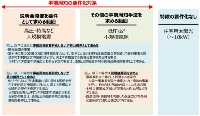``Resident briefings'' for renewable energy development, high pressure or higher is now a ``requirement'' from an obligation to make efforts

Way of thinking (draft) accompanying requirements for briefing sessions and prior notification
(Source: Ministry of Economy, Trade and Industry)
On November 9, the Ministry of Economy, Trade and Industry (METI) held an expert meeting to discuss issues such as strengthening the procedures of related laws and regulations and establishing requirements for communication with local communities as a systematic response to long-term use of renewable energy as a power source and coexistence with local communities. did.
In order to strengthen the procedures of related laws and ordinances, it is necessary to obtain permission in advance to apply for the feed-in tariff (FIT) and feed-in premium (FIP) certification under the Act on Special Measures Concerning Renewable Energy. Permission under the Etc. Control Law (Embankment Regulation Law) and Permission under the Three Sabo Laws (Sabo Law, Landslide Prevention Law, and Steep Slope Law).
Regarding these related laws and regulations, compliance is still required as part of the certification criteria, but at the application stage, it was not required to obtain approval. In the revised proposal for strengthening procedures, the above three laws and regulations will require that licenses and licenses have been obtained at the application stage and become a requirement.
Regarding communication with the local community, the current Renewable Energy Special Measures Law stipulates, "Efforts should be made to gain the understanding of local residents about the project, such as by holding briefing sessions after consulting with local governments on methods of communicating with local residents." is stipulated as a duty of effort.
In this review, it was stated that "under the Act on Special Measures Concerning Renewable Energy, the government requires advance notification to surrounding areas, including holding briefing sessions, as a requirement for FIT/FIP certification." The Secretariat's proposal changes the response depending on the scale. Large-scale power sources such as high-voltage and extra-high voltage, small-scale power sources such as low-voltage, and residential solar power (less than 10 kW). ”, and decided not to make it a requirement for residential solar power.
However, regarding rooftop installation projects, we do not require both large-scale and small-scale power sources, and request that they be made known in advance as an obligation to make efforts. In addition, in renewable energy promotion areas based on the Act on Promotion of Global Warming Countermeasures, cases where individual projects have already been discussed are considered to meet the briefing requirements.
In addition, even for low-voltage small-scale power sources, briefing sessions will be held in cases where multiple projects should be evaluated as a whole, in areas with a high risk of disaster such as landslide disaster warning areas, or in areas where the natural environment and landscape are protected by ordinance. I asked for






